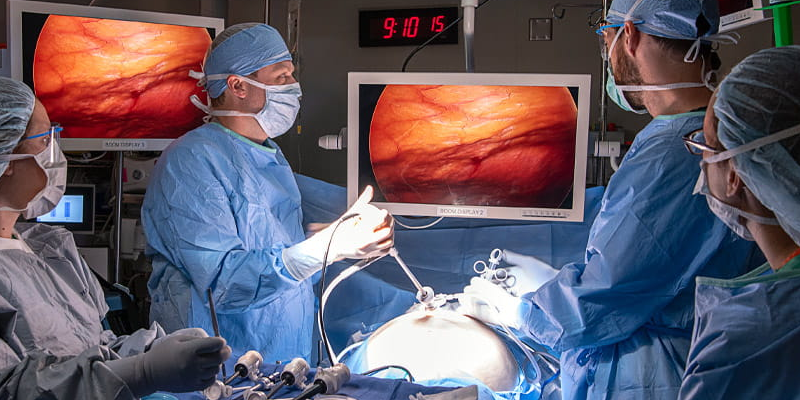
Gastrointestinal Surgery
Gastrointestinal (GI) surgery refers to surgical procedures performed on the digestive system, which includes the esophagus, stomach, intestines, liver, pancreas, gallbladder, and rectum. These surgeries are carried out to treat conditions such as cancer, inflammatory diseases, infections, blockages, and other structural or functional abnormalities of the digestive tract. Depending on the condition, gastrointestinal surgery may be performed using open surgery, laparoscopic (minimally invasive) techniques, or robotic-assisted procedures. With modern advancements, GI surgeries are safer, less invasive, and associated with faster recovery times and better outcomes.
Causes and Conditions Treated
Gastrointestinal surgery is often required when non-surgical treatments are ineffective or when the condition poses a serious health risk. Some of the common causes and conditions treated with GI surgery include:
– Gallstones and gallbladder disease
– Gastroesophageal reflux disease (GERD) and hiatal hernia
– Appendicitis
– Peptic ulcers with complications
– Intestinal obstruction or perforation
– Colon polyps and colorectal cancer
– Inflammatory bowel disease (Crohn’s disease, ulcerative colitis)
– Pancreatitis and pancreatic tumors
– Liver cysts, tumors, or cirrhosis-related complications
– Stomach and esophageal cancers
Symptoms That May Require Surgery
Symptoms vary depending on the underlying condition, but surgery is usually considered when symptoms are severe, persistent, or life-threatening. Patients may require gastrointestinal surgery if they experience:
– Persistent abdominal pain or cramping
– Difficulty swallowing or chronic acid reflux
– Unexplained weight loss and poor appetite
– Blood in stools or rectal bleeding
– Severe bloating or distension
– Nausea, vomiting, or intestinal obstruction
– Chronic constipation or diarrhea not responding to treatment
– Jaundice (in cases involving liver or gallbladder disease)
Diagnosis
A thorough diagnosis is essential before recommending gastrointestinal surgery. This usually involves a combination of physical examination, medical history evaluation, blood tests, and imaging studies such as ultrasound, CT scan, MRI, or endoscopy. In certain cases, biopsy samples may be collected to confirm cancer or other conditions. Doctors may also use advanced imaging like PET scans or specialized tests such as colonoscopy and ERCP (Endoscopic Retrograde Cholangiopancreatography) for detailed assessment.
Types of Gastrointestinal Surgeries
There are multiple types of GI surgeries depending on the disease, location, and severity. Some of the most common procedures include:
– Laparoscopic Cholecystectomy: Surgical removal of the gallbladder, usually due to gallstones.
– Fundoplication: A surgery to treat severe GERD and hiatal hernia by reinforcing the valve between the esophagus and stomach.
– Colectomy: Removal of part or the entire colon, often done for cancer, diverticulitis, or inflammatory bowel disease.
– Gastrectomy: Partial or total removal of the stomach for ulcers, cancer, or severe damage.
– Appendectomy: Removal of the appendix in cases of acute appendicitis.
– Pancreatic Surgery: Performed for pancreatic tumors, cysts, or chronic pancreatitis.
– Hepatic Surgery: Resection of a portion of the liver to remove tumors or cysts.
– Bowel Resection: Removal of diseased portions of the small or large intestine to restore healthy function.
Recovery and Post-Surgery Care
Recovery depends on the type and extent of surgery. Minimally invasive laparoscopic surgeries usually require shorter hospital stays (1–3 days), while open surgeries may need longer recovery. Patients are encouraged to start walking early to improve circulation and reduce complications. Diet is gradually reintroduced, starting with liquids and progressing to soft foods. Pain management, wound care, and prevention of infection are key aspects of post-surgical care. Patients may need long-term lifestyle modifications, including dietary changes, avoiding smoking and alcohol, and maintaining a healthy weight.
Benefits of Gastrointestinal Surgery
GI surgeries not only address life-threatening conditions but also significantly improve quality of life. Key benefits include:
– Relief from chronic pain and discomfort
– Improved digestion and nutrient absorption
– Removal of cancerous or precancerous growths
– Prevention of complications such as perforation, obstruction, or severe bleeding
– Enhanced ability to eat and maintain proper nutrition
– Long-term improvement in overall digestive health
– Increased life expectancy in cases of cancer and severe GI disorders

